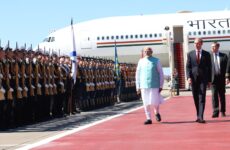Beijing, Authorities in Hong Kong and student-led protesters, weakened by the dwindling crowds of their supporters on the streets, are set to begin talks on Friday, which are unlikely to make much headway.
On Wednesday, only a couple of hundred protesters were camped out on in the main government and business districts in the city-a sharp fall from the earlier peak when tens of thousands of agitators had poured-into the streets.
The upcoming talks will focus on “the basis for political development”, but the room for flexibility is minimum. In 1990, China had floated its “Basic Law,” which made it unambiguous that the 2017 elections for the post of the Chief Execrative in Hong Kong would be held by universal suffrage among candidates who would be nominated by a committee. On August 31, the Standing Committee of the National People’s Congress, China’s top legislature had reiterated this position-triggering a spate a protests.
Lau Kong-wah, Hong Kong’s undersecretary of constitutional affairs, announced after talks on Tuesday with three student leaders that negotiations will commence on Friday. The formal meeting would be open to the media, he said, and each side could send five members to the talks. Friday’s meeting is also likely to determine the date and time of the second round of talks, signaling that the dialogue could be long drawn.
Chinese authorities have made it clear that there would not be any deviation from the “One country, two systems” formula that has given wide-ranging autonomy and freedoms to the people Hong Kong – a situation that does not prevail in mainland China. Yet, the protesters are demanding unconditional democracy-targeting Beijing’s position of vetting the candidates for the polls. Analysts point out that with a secessionist movement already brewing in Xinjiang, the Chinese authorities are unlikely to loosen their grip along the “peripheries” which could open the possibility of external interference. Chinese Vice Foreign Minister Li Baodong stressed on Wednesday that China has “always opposed outside forces interfering in Hong Kong’s internal affairs and China’s internal politics”.
Retailers in Hong Kong are apprehensive that the protests may result in a fall in sales in October-an important shopping month which includes a weeklong holiday period. Value of shares on the Hong Kong stock exchange have gone down by an estimated $ 50 billion since the protests began.




 Driving Naari Programme launched in Chandigarh
Driving Naari Programme launched in Chandigarh






























